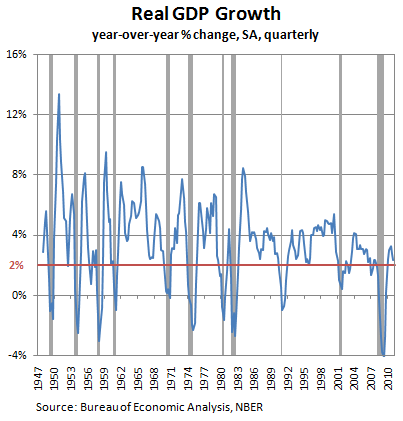Most Americans likely agree with the idea that the U.S. economy never really recovered from the Great Financial Crisis. And they’re right. What really happened is that we’ve been in a balance sheet recession which was necessarily papered over by government spending and easy monetary policy. So while there has been some technical recovery, there has been little about the current growth phase that is organic. That just is what it is. This is how a balance sheet recession works. Until the private sector has fully cleaned their balance sheets the economy remains sluggish and if the government doesn’t fill the void then we enter something that doesn’t just feel like a recession, but actually appears in the data as well.
So, just how close are we to seeing the data turn negative? Closer than most might think. According to a recent story from the Atlanta Fed (via Mark Thoma) the US economy is woefully close to an official double dip:
“The bottom line of this chart is that there has been a pretty reliable relationship between sustained bouts of sub-2 percent growth and U.S. recessions (indicated by the gray shaded areas). In fact, over the entire post-World War II era, periods in which year-over-year real GDP growth has been below 2 percent have been almost always associated with downturns in the economy.”
More importantly though, while it’s fun to label a specific period as “expansion” or “recession”, I still think that misses the bigger macro picture of the balance sheet recession. And with government beginning to reduce spending it shouldn’t come as a big surprise to anyone that the economy is slowing. Once one understands the dynamics of the balance sheet recession, you fully expect the reduction in government spending to expose a weaker than expected private sector. Whether we label that a “double dip” or not is really inconsequential to me.
Mr. Roche is the Founder and Chief Investment Officer of Discipline Funds.Discipline Funds is a low fee financial advisory firm with a focus on helping people be more disciplined with their finances.
He is also the author of Pragmatic Capitalism: What Every Investor Needs to Understand About Money and Finance, Understanding the Modern Monetary System and Understanding Modern Portfolio Construction.


Comments are closed.